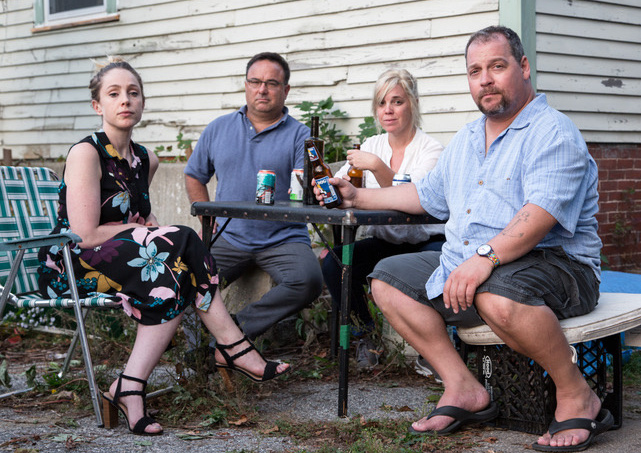Author Lisa D’Amour tells us that the characters in her play “Detroit,” the dark comedy opening the season for The Theater Project, live in a “midsize American city” that is “not necessarily Detroit.”
In this 2010 Pulitzer Prize finalist play, the author wants it to be known that tough economic times can bring the weird out in folks, even if they don’t live in the Motor City.
The play takes place in the adjacent backyards of two modest “first-ring” suburban homes that once suggested a bright future for inhabitants on the way up the economic ladder. They now house a new kind of sinking middle-class despair.
Ben and Mary are a 30-something couple barely making it on her salary as a paralegal and his severance pay as a victim of downsizing at a bank. They are surprised to learn that the long-empty house next door is suddenly occupied and quickly invite the new neighbors, Kenny and Sharon, over for a barbecue.
Things seem normal at first, but cracks in the casual facades of the two couples slowly begin to show. Mary drinks too much, and Ben dawdles while supposedly building a financial-planning website. Kenny and Sharon barely hold onto menial jobs as they struggle with a history of substance abuse.
Sharon, played by Lindsey Higgins, begins the revelatory process with a long, emotionally addled speech about there being “no real communication anymore.” Higgins is excellent in this and subsequent moments, eliciting both laughs and sympathy as she relates her offbeat dreams or goes off about her imaginary dog. The actress makes believable her take on the up-and-down personality who can party all night and then cry because “nothing ever happens.”
Shannon Campbell, as Mary, is right behind Higgins in emotional intensity, as she amplifies her character’s doubts to the point where she proposes going away to live in the woods. But Campbell also gets at the practical impulses that bond her to Ben in ways lost to Sharon and Kenny.
Ben and Kenny, played by Brent Askari and Corey Gagne, respectively, don’t find it so easy to emote but gain a moment of male bonding by devaluing everything besides having a mindless good time. Askari employs his considerable comic talents nicely to turn Ben’s initial defensiveness inside-out, letting loose his inner party animal.
Gagne suggests a nasty edge not far below the surface of his character’s affable exterior. His efforts to “not worry so much” will ultimately have serious consequences for his hosts.
Director Christopher Price, who also created the effective, ever-so-slightly claustrophobic scenic design, has a late cameo appearance as a relative who owns the house Kenny and Sharon occupy.
Price’s Frank warmly describes “what life used to be like” in the old neighborhood. He may be traveling a bit off into nostalgic fantasies, but it’s probably safe to say that life then was not quite as dire as it became for the two couples from “Detroit.”
Laughs, good acting and lots to think about make this production well worth a trip to Brunswick.
Steve Feeney is a freelance writer who lives in Portland.
Send questions/comments to the editors.


